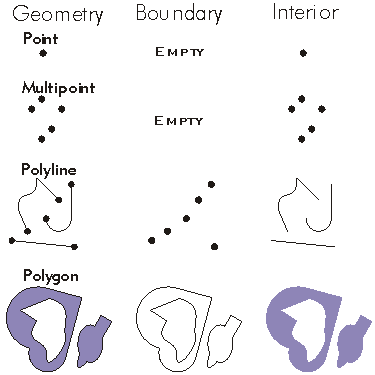 |
This document is archived and information here might be outdated. Recommended version. |
 |
This document is archived and information here might be outdated. Recommended version. |
Provides access to members that determine if a certain spatial relationship exists between two geometries.
Relational Operators compare two geometries and return a boolean indicating whether or not the desired relationship exists. Some relationships require that the input geometries be of the same dimension while other have more flexible dimensional constraints. Most of the predefined Relational Operators are mutually exclusive Clementini operators. Please see the "Shape Comparison Language" topic in the Technical Documents section in the help.
Relational Operators are used to determine whether or not a specific relationship exists between two geometries.
| Name | Description | |
|---|---|---|
 |
Contains | Indicates if this geometry contains the other geometry. |
 |
Crosses | Indicates if the two geometries intersect in a geometry of lesser dimension. |
 |
Disjoint | Indicates if the two geometries share no points in common. Negate this result to compute the Intersect relation. |
 |
Equals | Indicates if the two geometries are of the same type and define the same set of points in the plane. |
 |
Overlaps | Indicates if the intersection of the two geometries has the same dimension as one of the input geometries. |
 |
Relation | Indicates if the defined relationship exists. |
 |
Touches | Indicates if the boundaries of the geometries intersect. |
 |
Within | Indicates if this geometry is contained (is within) another geometry. |
| CoClasses and Classes | Description |
|---|---|
| Envelope | A rectangle with sides parallel to a coordinate system defining the extent of another geometry; optionally has min and max measure, height and ID attributes. |
| GeometryBag | An ordered collection of objects that support the IGeometry interface. |
| MultiPatch | A collection of surface patches. |
| Multipoint | An ordered collection of points; optionally has measure, height and ID attributes. |
| Point | A two dimensional point, optionally with measure, height, and ID attributes. |
| Polygon | A collection of rings ordered by their containment relationship; optionally has measure, height and ID attributes. |
| Polyline | An ordered collection of paths; optionally has measure, height and ID attributes. |
Only geometries that support the IRelationalOperator interface can be used as input geometries.

Relational operators has now been extended to support 3D polylines and that process can be generalized in three steps:
Please refer to the topic "Working with Vertical Segments" in "Learning ArcObject" section in the help.
IGeometry Interface | ITopologicalOperator Interface